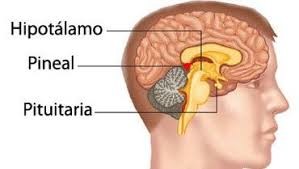The hypothalamus is a part of the brain that plays an extremely important role in feelings of hunger. First, the hypothalamus monitors the level of glucose (sugar) in the blood. When blood sugar is low, the hypothalamus causes sensations of hunger. Second, the hypothalamus keeps track of the body’s fat content by monitoring fatty substances in the blood. When the fat content falls below a certain predetermined level, called a set point, the hypothalamus increases our desire to eat. Conversely, when the fat content of the blood rises above the set point, the hypothalamus decreases the desire to eat. Thus, the hypothalamus acts something like a thermostat for the level of body fat.
The role of the hypothalamus in controlling hunger and eating becomes clearly evident when the hypothalamus is damaged. When a certain portion of the hypothalamus is destroyed in laboratory animals, signals to stop eating are eliminated. and the animals eat compulsively and continuously. These animals ultimately attain monstrous proportions—often two to three times their normal body weight . Such animals are referred to as hyperphagic, from the Greek words meaning “overeating.” When humans have tumors in the same part of the hypothalamus, they too become obese.
Among the processes that are responsible for regulating the hypothalamus are:
- Sleep levels and the circadian cycle .
- Sexual arousal and the behavior associated with it .
- The level of hunger.
- Blood pressure
- Muscle tension
- The body temperature
- The energy levels available.
The Main Functions of the Hypothalamus Are
Energy levels
sleep cycles
temperature
blood pressure
muscle function
immune system
sexual behavior
hunger
Most of these functions are regulated by a chain of hormones that inhibit or excite each other.
Hunger
When our body detects that we do not have sufficient energy reserves, then we need to eat food. It sends Ghrelin (a hormone) to the hypothalamus, indicating that we have to eat. In this way, the hypothalamus releases Neuropeptide Y, which is the hormone that produces that sensation of hunger.
Satiety :
On the contrary, when we have eaten enough, our body must tell our brain that we do not need more food and that we have to stop eating. As we eat, our body produces insulin, which increases the production of a hormone called “leptin”. Leptin travels through the blood to the ventromedial nucleus of the hypothalamus and, when it reaches its receptor, inhibits the production of Neuropeptide Y. When it stops producing Neuropeptide Y, we stop being hungry or, in other words, we feel satiety.
Thirst
In a similar way to hunger, when the body needs more water, the hypothalamus releases antidiuretic hormone (or vasopressin), which act to prevent water loss and promote fluid intake.
Temperature
The temperature at which blood reaches the hypothalamus will determine if we need to reduce or increase body temperature. If the temperature is too high, we need to lose heat, which will cause the anterior portion of the hypothalamus (anterior hypothalamus) to inhibit the posterior portion
. On the other hand, if the temperature is too low, we need to produce heat, which will cause the posterior portion of the hypothalamus (posterior hypothalamus) to inhibit the anterior. Thus, through the hypothalamus-pituitary axis, the thyroid stimulating hormone (TSH) and the adrenocorticotropic hormone (ACTH) will be released, favoring the preservation of heat.
Dream:
The reason why we have trouble sleeping with the light on is in the hypothalamus. The sleep-wake cycle is regulated by the circadian cycle. The structure that is responsible for the regulation of the circadian cycle is a set of neurons of the medial hypothalamus called the suprachiasmatic nucleus. The suprachiasmatic nucleus receives information from the ganglion cells of the retina by means of the retinohipothalamic tract. In this way, the retina detects changes of light on the outside and sends this information to the suprachiasmatic nucleus.
Emotions
When we experience an emotion, it is accompanied by physiological changes. If we walk alone at night and have to cross a dark street where you hear strange noises, our most likely reaction is to feel afraid. The body needs to be prepared for any circumstance and that is why our hypothalamus sends information to the different parts of our body (it increases breathing, heart rate, constricts blood vessels, dilates the pupils and tightens the muscles). In this way, it allows us to detect any threat and run or defend ourselves if necessary. Therefore, the hypothalamus is responsible for the physiological changes related to each emotion.

